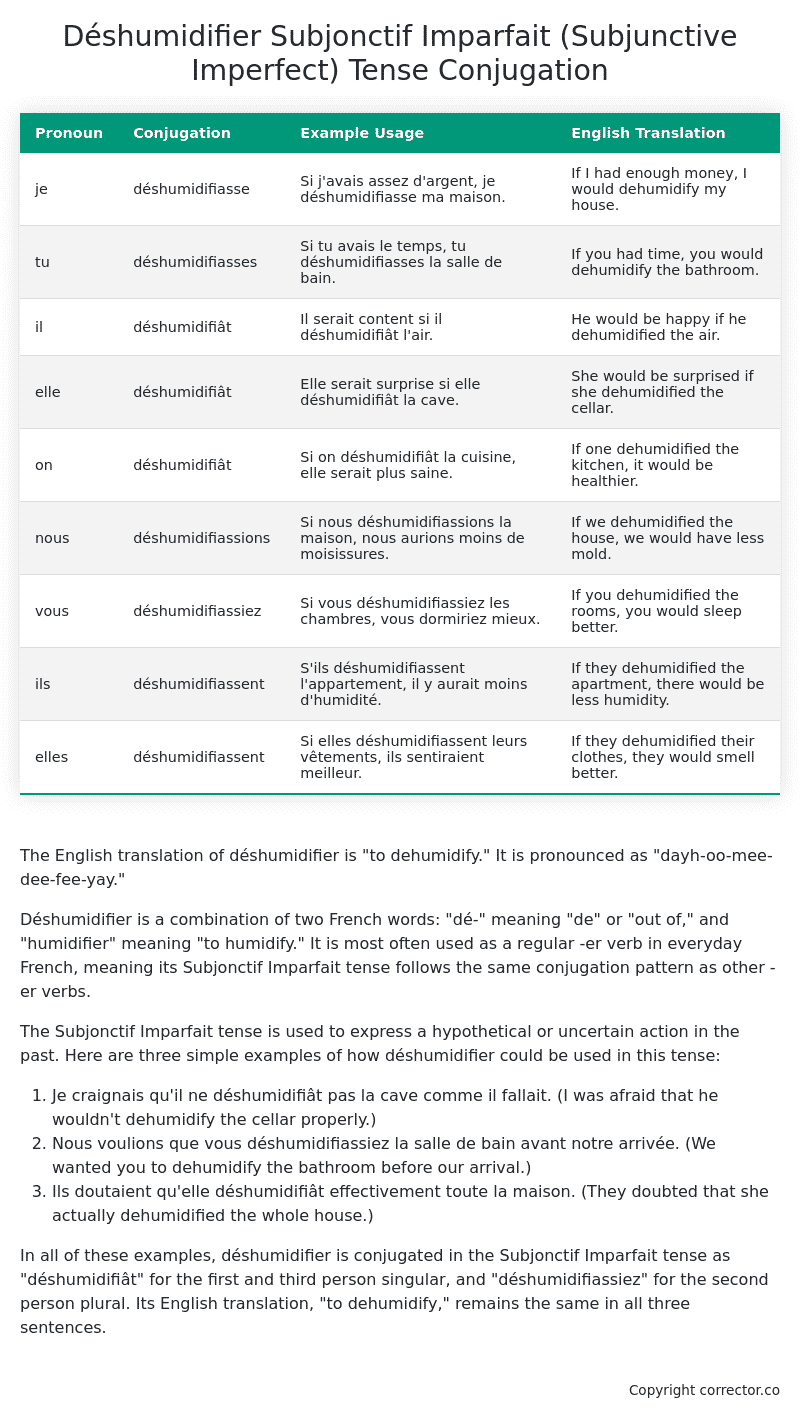Subjonctif Imparfait (Subjunctive Imperfect) Tense Conjugation of the French Verb déshumidifier
Introduction to the verb déshumidifier
The English translation of déshumidifier is “to dehumidify.” It is pronounced as “dayh-oo-mee-dee-fee-yay.”
Déshumidifier is a combination of two French words: “dé-” meaning “de” or “out of,” and “humidifier” meaning “to humidify.” It is most often used as a regular -er verb in everyday French, meaning its Subjonctif Imparfait tense follows the same conjugation pattern as other -er verbs.
The Subjonctif Imparfait tense is used to express a hypothetical or uncertain action in the past. Here are three simple examples of how déshumidifier could be used in this tense:
- Je craignais qu’il ne déshumidifiât pas la cave comme il fallait. (I was afraid that he wouldn’t dehumidify the cellar properly.)
- Nous voulions que vous déshumidifiassiez la salle de bain avant notre arrivée. (We wanted you to dehumidify the bathroom before our arrival.)
- Ils doutaient qu’elle déshumidifiât effectivement toute la maison. (They doubted that she actually dehumidified the whole house.)
In all of these examples, déshumidifier is conjugated in the Subjonctif Imparfait tense as “déshumidifiât” for the first and third person singular, and “déshumidifiassiez” for the second person plural. Its English translation, “to dehumidify,” remains the same in all three sentences.
Table of the Subjonctif Imparfait (Subjunctive Imperfect) Tense Conjugation of déshumidifier
| Pronoun | Conjugation | Example Usage | English Translation |
|---|---|---|---|
| je | déshumidifiasse | Si j’avais assez d’argent, je déshumidifiasse ma maison. | If I had enough money, I would dehumidify my house. |
| tu | déshumidifiasses | Si tu avais le temps, tu déshumidifiasses la salle de bain. | If you had time, you would dehumidify the bathroom. |
| il | déshumidifiât | Il serait content si il déshumidifiât l’air. | He would be happy if he dehumidified the air. |
| elle | déshumidifiât | Elle serait surprise si elle déshumidifiât la cave. | She would be surprised if she dehumidified the cellar. |
| on | déshumidifiât | Si on déshumidifiât la cuisine, elle serait plus saine. | If one dehumidified the kitchen, it would be healthier. |
| nous | déshumidifiassions | Si nous déshumidifiassions la maison, nous aurions moins de moisissures. | If we dehumidified the house, we would have less mold. |
| vous | déshumidifiassiez | Si vous déshumidifiassiez les chambres, vous dormiriez mieux. | If you dehumidified the rooms, you would sleep better. |
| ils | déshumidifiassent | S’ils déshumidifiassent l’appartement, il y aurait moins d’humidité. | If they dehumidified the apartment, there would be less humidity. |
| elles | déshumidifiassent | Si elles déshumidifiassent leurs vêtements, ils sentiraient meilleur. | If they dehumidified their clothes, they would smell better. |
Other Conjugations for Déshumidifier.
Le Present (Present Tense) Conjugation of the French Verb déshumidifier
Imparfait (Imperfect) Tense Conjugation of the French Verb déshumidifier
Passé Simple (Simple Past) Tense Conjugation of the French Verb déshumidifier
Passé Composé (Present Perfect) Tense Conjugation of the French Verb déshumidifier
Futur Simple (Simple Future) Tense Conjugation of the French Verb déshumidifier
Futur Proche (Near Future) Tense Conjugation of the French Verb déshumidifier
Plus-que-parfait (Pluperfect) Tense Conjugation of the French Verb déshumidifier
Passé Antérieur (Past Anterior) Tense Conjugation of the French Verb déshumidifier
Futur Antérieur (Future Anterior) Tense Conjugation of the French Verb déshumidifier
Subjonctif Présent (Subjunctive Present) Tense Conjugation of the French Verb déshumidifier
Subjonctif Passé (Subjunctive Past) Tense Conjugation of the French Verb déshumidifier
Subjonctif Imparfait (Subjunctive Imperfect) Tense Conjugation of the French Verb déshumidifier (this article)
Conditionnel Présent (Conditional Present) Tense Conjugation of the French Verb déshumidifier
Conditionnel Passé (Conditional Past) Tense Conjugation of the French Verb déshumidifier
L’impératif Présent (Imperative Present) Tense Conjugation of the French Verb déshumidifier
L’infinitif Présent (Infinitive Present) Tense Conjugation of the French Verb déshumidifier
Struggling with French verbs or the language in general? Why not use our free French Grammar Checker – no registration required!
Get a FREE Download Study Sheet of this Conjugation 🔥
Simply right click the image below, click “save image” and get your free reference for the déshumidifier Subjonctif Imparfait tense conjugation!

Déshumidifier – About the French Subjonctif Imparfait (Subjunctive Imperfect) Tense
Formation
Common Everyday Usage Patterns
Interactions with Other Tenses
Subjonctif Présent
Indicatif Passé Composé
Conditional
Conditional Perfect
Summary
I hope you enjoyed this article on the verb déshumidifier. Still in a learning mood? Check out another TOTALLY random French verb conjugation!


